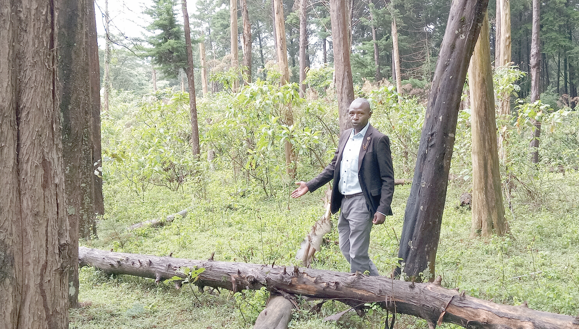Overgrown trees in Nandi forest to cost State over Sh100m

The government is losing revenue over Sh100 million as mature and overgrown trees in a gazetted government forest in Nandi county continue to rot, members of a local Community Forest Association have said.
The association has asked the concerned authorities to expedite the process of harvesting the tree plantation to get rid of the old stock in the expansive forest.
The association’s chair Peter Butuk said the exotic trees were grown in late 1990s and they have attained maximum maturity and need to be harvested without further delay.
He said that more trees are being uprooted, noting that for the past five years since the government imposed a moratorium there is no hope of salvaging the mature trees.
“For years, we have been working with the Kenya Forest Service in raising the trees until they are mature. It has been of great help to the community that enhanced sustainable food security and source of fuel,” said Butuk.
A spot check by People Daily, showed that most of the exotic trees including pines and cypress trees have fallen and some broken at the tips, exposing them to diseases.
The affected sections of Nandi forest include Iruru, Kolong, Kapsasur, Kaptoroi, Kejire and Kamurguiywo.
“Over 46 hectares of the forest cover is aging and the government will loss it to rotting and decaying unless urgent measure is taken to harvest the overgrown trees,” he said.
He added: “It would have been prudent for the government to utilise the ongoing tree-growing initiatives across the country to replace the stalk in the public forests.”
Butuk said that local sawmilling companies are being forced to outsource timber from Elgeyo Marakwet and Kakamega counties, a mission which he termed costly.
Lydia Chepkemboi, one of the proprietors of the sawmill company admitted that they have been working with a lean number of workers since the moratorium was imposed by the government in 2018.
“Initially, we employed over 100 workers in the milling facility but now we are left with 30 of them that we can afford to pay,” she said.
Immature trees
Chepkemboi claimed that they resorted to buying timber from local communities to remain afloat in the timber industry.
“The challenge is that we get immature trees from private farms that do not meet the required standard. It is unreasonable to see rotting trees in our forests yet we waste more money sourcing timber from far,” said Chepkemboi.
Dennis Kerengo, the Nandi Ecosystem Conservator admitted that there is an urgent consideration for thinning of trees on a large scale in the region to mitigate the shortage of timber in the country.
“We have over three million seedlings in our tree nurseries but we have no space to grow them. The fallen trees have led to frequent conflicts between the KFS and members of the community attempting to illegally fetch firewood from the fallen trees in the forest,” said Kerengo.
He revealed that many environmental conservationists have come out in support of the government tree planting initiatives ready for the reforestation process in the region.











